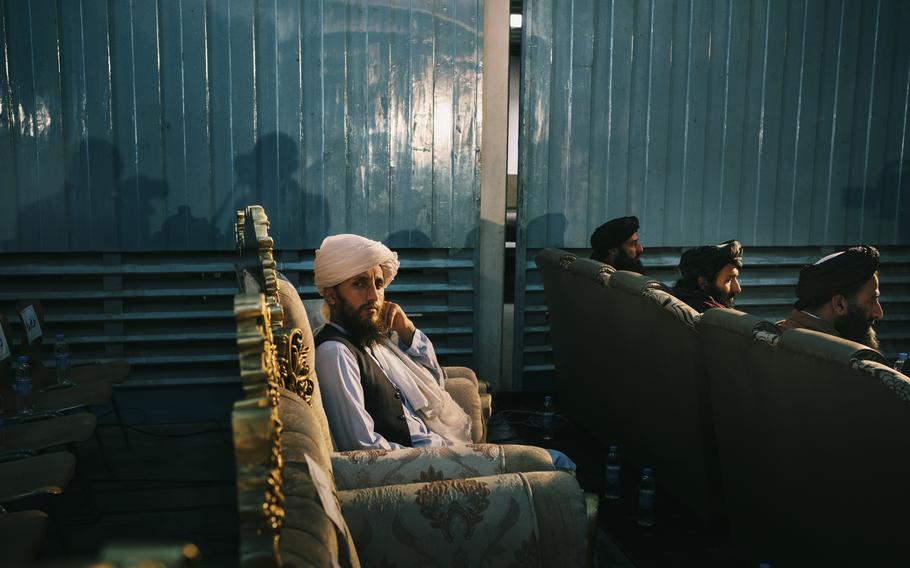
A Taliban official attends a ceremony for the re-opening of the schools at the Amani high school. (Lorenzo Tugnoli/The Washington Post)
KABUL, Afghanistan — One victim was the caretaker of a neighborhood mosque, a modest man in his mid-50s known for helping those in need. The other was a promising high school senior, ranked second in his class and studying for his college entrance exams.
On Tuesday, within minutes of each other, both lay dying on the same sidewalk, wounded by two successive bomb blasts outside the walls of a large public school in Dasht-i-Barchi, a bustling working-class neighborhood that is the center of Kabul's minority Shiite Hazara community.
Police said that nine people had been killed and 19 wounded Tuesday. Six of the injuries occurred in a separate blast near a private tutoring center in the area. No group has claimed responsibility.
The older man, Syed Hussain Hussani, and the younger one, 18-year-old Milad Alizada, were buried after sunrise in simple earthen graves, covered with rose petals and unmarked stones. Afterward, in their homes, friends and relatives gathered for ritual prayers, tearful condolences and silent contemplation.
On all their minds, as much as the loss of a loved one, was the same question: Why is this happening to us again?
After years of frequent terrorist attacks on the Hazara community, most attributed to Sunni extremists affiliated with the Islamic State, a rare calm had set in since August, when the Sunni Taliban movement took power, promising to bring security to the capital.
After the bombings, mourners and other residents of Dasht-i-Barchi expressed a mixture of suspicion, frustration and vague conspiracy theories. Some said the Islamic State group, known here as Daesh, had taken a break during the transition of power and wanted to display its strength again. Some suggested the Taliban was secretly behind the attacks, seeking to suppress an ambitious rival group. Others were circumspect, blaming unknown "enemies" of Afghanistan.
"Everyone is scared again now, but they are not sure who to be scared of," said Sayed Yacub, a cousin of Hussaini's, fingering prayer beads as he sat in a carpeted room with a dozen other men. "These attackers have no humanity, so they cannot be Muslims. Since the international community left, people here have been struggling just to survive. What is there to be gained from bringing such violence now?"
The school struck in the bombings, Abdul Rahman Shahid, was a high-profile target — one of the largest in the capital, with 16,000 pupils studying in four shifts a day, and girls separated from boys in accordance with the Taliban's strict rules. It was known for its high academic standards and record numbers of high-scoring students in college entrance exams.
Some relatives of slain students wondered whether the attackers had purposely chosen the exact time when most senior-level students — the ones headed soonest for higher education or professions — left the high-walled campus each day. Friends of Alizada, who was taking courses in science and computer programming, said he would have become an example for other Hazara youths.
"The Taliban don't want us to compete with them," said one friend at the mourning ceremony, a technology professional who lost his job after the Taliban took power. "They don't want people from our community to gain knowledge and have a good future."
Over the past seven years, the Islamic State has been blamed for dozens of bombings and gun attacks on mosques, shrines, schools, sports facilities, voter registration centers, religious holiday events and political gatherings in the community. The group views Shiites as apostates.
Across the sprawling community of several hundred thousand people, everyone seemed to know someone who had been killed in a terrorist attack in recent years. Several parents of wounded Shahid school students had already lost a son or daughter in attacks on schools or college-prep study centers.
"Sometimes it is too much to bear," said Alizada's father, Mohammad Hassan, who works as a cook and said he lost an uncle in a bombing several years ago. He was at work Tuesday when the school attack happened and spent hours looking for his oldest son. Finally, wandering into a chaotic hospital emergency room, he recognized his body in a refrigerated drawer.
"He was so smart, and he had so many dreams," said Hassan, weeping as he spoke and burying his face in his hands.
The bombings at the Shahid school bore a macabre similarity to the last major attack on the Hazara community, just over a year ago. At the Sayed ul Shahda school in May, twin bombs exploded outside the school just as upper-class girls were leaving campus. More than 90 people died, most of them teenage girls.
As grief, fear and suspicion spread across Dasht-i-Barchi this week, one universal demand was clear: Now that the Taliban has taken formal responsibility for public safety, many people said, the new authorities must protect the Hazara community.
"This is their job now, and they must do better in providing for our security," said one of the mourners at Alizada's house. "If they don't, we will have to find a way to protect ourselves."